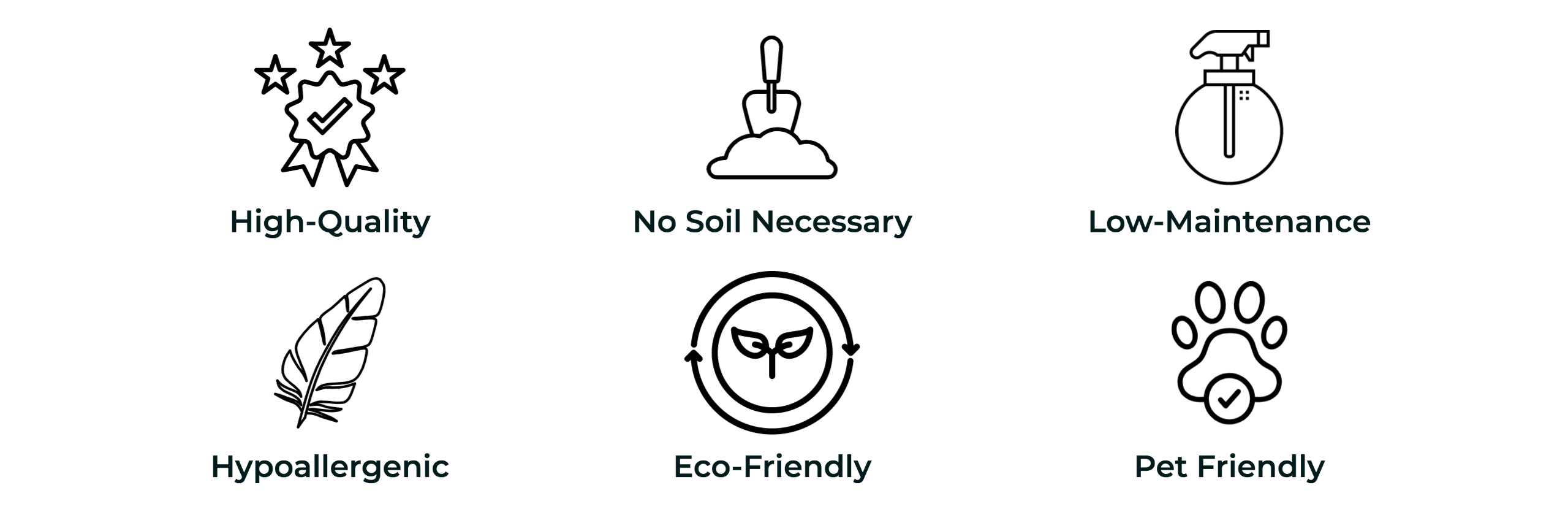

Blending Nature with Contemporary Design
We pride ourselves on providing a solution that offers a unique blend of functionality and aesthetics for urban dwellers seeking a connection with nature who might not have the time or expertise needed for traditional gardening (or who just think air plants are cool as we do).


Curious About Air Plants?
Frequently Asked Questions
What is an Air Plant?
An air plant is a type of houseplant that doesn't need soil to grow. Unlike most plants that draw nutrients from the soil, air plants get their nutrients from the air around them. They absorb water and nutrients through tiny scales on their leaves.
Because they don't need soil, you can place them just about anywhere - on a windowsill, attached to a piece of wood, in a glass terrarium, or even hanging from a piece of string! They're super low-maintenance and a great way to add a touch of green to your home without needing a green thumb.
Are Air Plants Pet Safe?
Yes, air plants are typically safe for pets. They are non-toxic to cats and dogs according to the ASPCA (American Society for the Prevention of Cruelty to Animals). However, as with any plant, it's always a good idea to place them out of reach if your pet is prone to chewing on houseplants. Even though they aren't poisonous, if your pet eats a lot of plant material, it could potentially lead to digestive upset. Also, each pet is unique and might have individual sensitivities or allergic reactions, so it's always best to monitor new plants and their effects on your pets.
Are Air Plants Hypoallergenic?
Air plants, or Tillandsia, are generally considered hypoallergenic because they don't release pollen into the air, which is a common cause of allergies. This makes them a popular choice for people who are sensitive to allergens.
However, it's important to note that while they don't release pollen, dust and other allergens can accumulate on their leaves, just like on any other indoor surface. Regularly cleaning or rinsing your air plants can help to mitigate this.
Remember, everyone's allergies are different, so while air plants are generally a good choice for those with allergies, individuals may still have varying reactions.
Do Air Plants Purify the Air?
Like all plants, air plants (Tillandsia) do help purify the air to some extent. They are capable of photosynthesis, which means they take in carbon dioxide and release oxygen, contributing to cleaner air.
However, it's worth noting that the ability of houseplants to significantly purify indoor air is often overstated. The original NASA study that found plants could help purify air was conducted in a sealed environment, which doesn't accurately reflect typical home or office conditions. While having plants can certainly contribute to a healthier and more pleasant environment, they aren't a substitute for proper ventilation and air filtration.
Air plants also have a unique ability to absorb pollutants and nutrients directly from the air through their leaves, but the overall effect of this on indoor air quality is not fully understood and is likely to be quite minor.
In summary, while air plants can contribute to air quality in a small way and offer other benefits like aesthetic appeal and promoting wellbeing, they are not a panacea for air purification.
Plant Yourself in Our Community
Be the first to know about new creations and exclusive offers.
